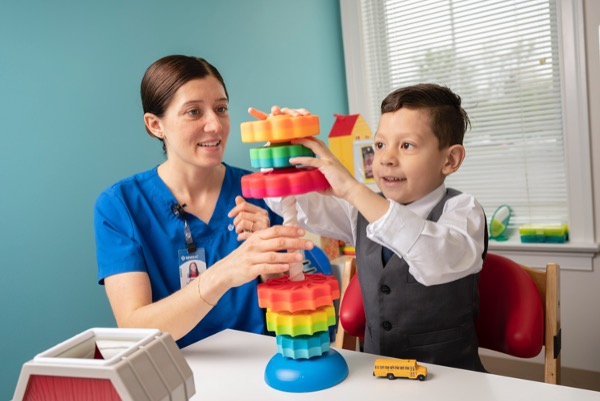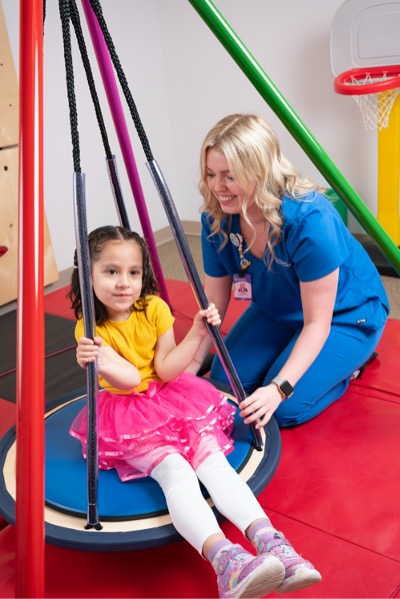
Pediatric Occupational Therapy
Occupational therapy (OT) services help children learn and grow in their daily living skills to promote their independence. OT can help kids improve in their play, motor, sensory, and cognitive skills as well as improve their self-esteem and sense of accomplishment by meeting their own personal milestones!

Play Skills
Play skills help a child make sense of the world around them. Play promotes sensory exploration, problem solving, and the development of social skills.
Difficulties in play skills can include:
- Does not initiate play on their own
- Play is limited or very repetitive
- Does not play with toys appropriately
- Prefers to play alone
Gross Motor Skills
 Gross motor skills involve the use of the large muscles of the body (arms,
legs) to perform everyday functions, such as standing and walking, running
and jumping, throwing and catching a ball, and sitting upright at a table.
Gross motor skills involve the use of the large muscles of the body (arms,
legs) to perform everyday functions, such as standing and walking, running
and jumping, throwing and catching a ball, and sitting upright at a table.
Difficulties in gross motor skills can include:
- Delayed milestones in crawling, walking
- Often bumps into people and things
- Unable to balance effectively
- Has trouble learning to climb stairs, jump and skip
- Struggles to throw or catch a ball
Fine Motor/Self-Help Skills
Fine motor skills involve the coordination of small muscles to control hand, fingers, and thumb to complete daily living skills such as dressing and handwriting skills.
Difficulties in fine motor skills can include:
- Difficulty working buttons, snaps, zippers, and shoelaces
- Problems performing self-care tasks independently
- Difficulty using scissors
- Trouble grasping pencils/crayons for writing or drawing
- Fatigues easily with fine motor tasks
Sensory Processing/Integration
Sensory processing, or sensory integration, allows kids to learn through their senses. Eight senses are considered: sight, hearing, taste, smell, touch, vestibular, proprioceptive, and interoceptive. Typical sensory processing involves responding appropriately to everyday sensory experiences in a child's environment. Some children may over-react or under-react to certain sensations and/or seek out or avoid sensations.
Difficulties in sensory processing can include:
- Constantly moving (spins, crashes)/Fearful of movement (swings, slides)
- Biting or putting objects in mouth
- Does not respond to name or other noises/covers ears to avoid noises
- Does not like getting messy (playdoh, paint, mud)
- Does not know when hungry, thirsty, needs to use toilet
Visual Perceptual Skills
Visual perceptual skills integrate eyes, muscles, and brain to create a picture of the world. Skills involve following objects with eyes, using eyes to identify objects and shapes in space and differences or similarities.
Difficulties in visual perceptual skills include:
- Confusing b, d, p, q
- Letter reversals
- Completing games like puzzles, I-spy, and mazes
- Difficulties with handwriting (writing on the line, spacing, reversals)
Executive Functioning Skills
Executive functioning skills are skills that allow the brain to organize, regulate, manage, and control thoughts. These skills enable children to plan, organize, remember things, prioritize, pay attention and get started or complete tasks.
Difficulties in Executive Functioning Skills include:
- Easily distracted/impulsive
- Difficulty following directions
- Difficulty sitting for favorite and new activities/lack of being able to stay on task
- Difficulty with memory/loses things frequently
- Planning and carrying out an activity from beginning to end
Self-Regulation Skills
Self-regulation skills include the ability for children to manage their emotions and behavior in situations. Children can learn to adjust to changes in situations, being able to calm self and handle their frustration and feelings.
Difficulties with self-regulation include:
- Tantrums or physical/emotional reactions out of proportion with the situation
- Lack of understanding of emotions/unable to identify own feelings
- Difficulty calming down when upset
- Potentially aggressive/self-injurious behavior
Social Skills
Social skills are skills which allow children to meet their milestones through learning from peers and adults the appropriate ways to interact with their world. Engagement in social settings promotes positive relationships, play, attention, and self-regulation skills.
Difficulties in social skills may include the following:
- Lack of eye contact
- Difficulties with turn-taking in play
- Becomes upset when “loses” a game
- Unaware of others’ feelings and reading verbal and nonverbal social cues
- Interrupt others frequently, have significant difficulty sharing
- May not understand consequence of their actions

